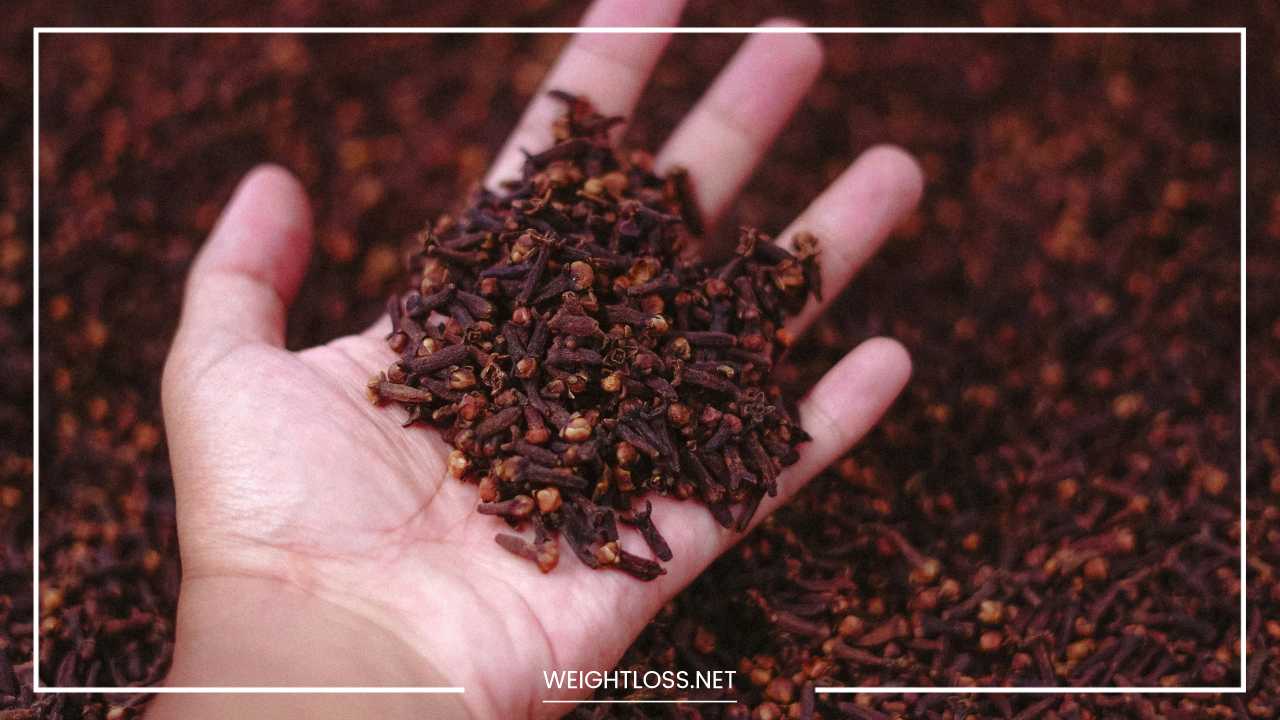Cloves Uses and Health Benefits

Cloves
Cloves: The Potent Spice with Powerful Health Benefits
Cloves, those tiny aromatic buds that grace your pumpkin pie and potpourri, hold a history as rich and multifaceted as their flavor. Used for centuries in both culinary and medicinal applications, cloves boast a surprising number of health benefits.
Delving deeper into the world of cloves, we’ll explore their fascinating journey throughout history, delve into their diverse uses in cooking, and unveil the science-backed reasons to incorporate them into your diet.
A Voyage Through Time: The History of Cloves
The clove tree, Syzygium aromaticum, is native to the Moluccas Islands in Indonesia, a region also known as the Spice Islands. For millennia, cloves have been a prized commodity, finding their way along ancient trade routes dating back as early as 2,000 years ago.
Evidence suggests cloves reached China as early as the Han Dynasty (206 BCE – 220 CE), where they were valued for their medicinal properties and unique flavor.
The Romans and Egyptians also incorporated cloves into their culinary and medicinal practices, though likely at exorbitant prices due to the long and perilous journey from Southeast Asia.
The spice trade flourished in the Middle Ages, with cloves fetching exorbitant prices due to their rarity and the control exerted by various empires and merchant guilds over their trade routes.
The Venetian Republic, for instance, dominated the clove trade in Europe for centuries, jealously guarding their access to the Spice Islands.
This control eventually spurred European exploration, with explorers like Vasco da Gama seeking alternative routes to the East in search of spices like cloves.
The discovery of a sea route around Africa by the Portuguese in the late 15th century eventually broke the Venetian monopoly and ushered in a new era of global spice trade.
The allure of cloves wasn’t just about flavor; they were also believed to possess potent medicinal properties. Traditional Chinese medicine used cloves to treat a variety of ailments, including toothaches, indigestion, and respiratory problems.
In Europe, cloves were used as an anesthetic and antiseptic, and were even believed to ward off the plague. The association of cloves with wealth and health further solidified their status as a coveted commodity.
Today, cloves remain an important spice in global cuisine, with Indonesia, Madagascar, and Zanzibar being the leading producers.
The global spice trade has evolved significantly, with cloves readily available in most grocery stores. However, the legacy of cloves as a symbol of exploration, cultural exchange, and the pursuit of health continues to resonate.
A Symphony of Flavor: Unveiling the Culinary Versatility of Cloves
Cloves are a versatile spice that can elevate both sweet and savory dishes. Their pungent, warming flavor profile is attributed to eugenol, a compound that also contributes to cloves’ medicinal properties.
Eugenol interacts with the taste receptors on your tongue, creating a unique warmth and a characteristic clove-like taste.
Beyond eugenol, cloves contain a complex blend of volatile oils that contribute to their aromatic profile, with hints of cinnamon, pepper, and even a touch of citrus.
Here’s a deeper dive into how to incorporate cloves into your cooking to unlock their full flavor potential:
-
Whole Cloves: Stud an onion or orange with whole cloves for simmering in broths, soups, and stews. They add a subtle depth of flavor without overpowering the dish. Whole cloves are also traditionally used in pickling brines and spice rubs for meats. When using whole cloves, it’s important to remove them before serving, as they can be quite hard and unpleasant to bite into.
-
Ground Cloves: A sprinkle of ground cloves adds warmth to curries, rice dishes like biryani, and spice rubs for meats like lamb or pork. A pinch in baked goods like cookies, cakes, and pies enhances the other spices and creates a cozy, autumnal flavor. For a more intense clove flavor, toast ground cloves in a dry pan over low heat for a few minutes before adding them to your dish.
-
Clove Oil: Use sparingly, as clove oil is highly concentrated. A drop can add a kick to homemade marinades, salad dressings, or mulled cider. Clove oil can also be used to create infused oils or vinegars for a unique flavor twist. Important Note: Due to its potency, clove oil should never be ingested undiluted.
Beyond the Savory: Cloves can also be used to create a festive and aromatic atmosphere during the holiday season. Simmer a few whole cloves in water with orange peels, cinnamon sticks, and star anise for a natural home fragrance.
Dried clove pomanders, oranges studded with cloves and dried, are a traditional and beautiful seasonal decoration that adds a touch of warmth and spice to your home.
A Scientific Exploration: Unveiling the Health Benefits of Cloves
Cloves are not just delicious; they’re packed with potential health benefits thanks to a unique blend of bioactive compounds. Here’s a closer look at the science behind some of their key properties:
-
Antioxidant Powerhouse: Cloves are rich in antioxidants, compounds that help fight free radicals in the body. Free radicals are unstable molecules that can damage cells and contribute to chronic diseases like heart disease, cancer, and Alzheimer’s disease. The antioxidants in cloves, particularly eugenol, may help protect your cells from this damage by neutralizing free radicals. Studies have shown that clove extract exhibits strong antioxidant activity in laboratory settings [1].
-
Anti-inflammatory Effects: Inflammation is a natural immune response that helps the body fight infection and heal injuries. However, chronic inflammation can contribute to various health problems, including arthritis, inflammatory bowel disease (IBD), and certain cancers. Studies suggest that clove oil may have anti-inflammatory properties. Eugenol, the main component of clove oil, has been shown to inhibit the activity of inflammatory enzymes in the body [2]. More research is needed to fully understand the effectiveness of cloves in managing inflammatory conditions, but the initial findings are promising.
-
Blood Sugar Regulation: Some research suggests that cloves may help regulate blood sugar levels. Animal studies have shown that clove extract may improve insulin sensitivity and lower blood sugar levels [3]. Insulin is a hormone that helps the body absorb glucose (sugar) from the bloodstream into cells for energy. Improved insulin sensitivity means your body’s cells become more responsive to insulin, leading to better blood sugar control. While more human research is needed, cloves could be a potential dietary aid for people with prediabetes or type 2 diabetes, but it’s important to consult with your doctor before incorporating them into your diabetes management plan.
-
Oral Health Benefits: Cloves have a long history of use in traditional medicine for oral health. Eugenol, the main component of clove oil, has numbing properties that can provide temporary relief from toothaches. A 2010 review of studies found that topical application of clove oil was as effective as benzocaine, a common anesthetic, in relieving toothache pain [4]. Additionally, cloves may have antibacterial properties that could help fight bacteria that contribute to cavities and gum disease. While clove oil can be used topically for toothaches, it should be diluted with a carrier oil like coconut oil before application. Never ingest undiluted clove oil, as it can be toxic.
-
Digestive Support: Cloves have been used traditionally to aid digestion. Eugenol may help relax the muscles in the digestive tract, potentially relieving symptoms of indigestion like nausea and bloating. Animal studies suggest that clove extract may also help protect the stomach lining from ulcers [5]. More research is needed to confirm these benefits in humans, but cloves may be a natural remedy to consider for occasional digestive discomfort.
-
Bone Health: Cloves are a good source of manganese, a mineral essential for bone health. Manganese helps the body produce collagen, a protein that provides structure and strength to bones. Studies have shown that low manganese intake is associated with an increased risk of osteoporosis [6]. Including cloves in your diet, along with other manganese-rich foods like nuts, seeds, and whole grains, can contribute to maintaining strong bones.
Important Note: While cloves offer potential health benefits, it’s important to remember that they are not a cure-all. Consult with your doctor before using cloves medicinally, especially if you have any underlying health conditions or are taking medications. For instance, clove oil can interact with blood thinners and other medications.
Beyond the Kitchen: Exploring Alternative Uses of Cloves
The uses of cloves extend beyond culinary applications. Here are a few ways to incorporate cloves into your life for their potential health benefits:
-
Clove Oil Diffusion: Diffusing a few drops of diluted clove oil in an essential oil diffuser can create a relaxing and invigorating atmosphere. Clove oil’s antiseptic properties may also help purify the air. Important Note: When diffusing clove oil, ensure proper ventilation and dilute it with a carrier oil like jojoba oil.
-
Topical Application (Diluted): As mentioned earlier, diluted clove oil can be applied topically for temporary toothache relief. However, due to its potency, it should never be used directly on the skin and should be diluted with a carrier oil before application.
-
Natural Moth Repellent: The strong aroma of cloves may help deter moths. Place a sachet filled with whole cloves in your closet or drawers to keep moths at bay.
A World of Flavor: Culinary Adventures with Cloves
Having explored the history and science behind cloves, let’s delve deeper into their culinary versatility. Here are some additional ways to incorporate cloves into your dishes and elevate your cooking game:
-
Spice Rubs: Ground cloves are a welcome addition to spice rubs for meats like lamb, pork, or chicken. The warm, aromatic profile of cloves complements other spices like cumin, coriander, and paprika, creating complex flavor layers.
-
Marinades: A touch of ground cloves can add depth and warmth to marinades for meats, vegetables, or tofu. For a Moroccan-inspired twist, combine cloves with ginger, garlic, cumin, and a hint of cinnamon to create a flavorful marinade for lamb or chicken.
-
Desserts: Cloves are not just for savory dishes. A pinch of ground cloves adds a warm, exotic touch to baked goods like cookies, cakes, and pies. They pair particularly well with autumnal flavors like pumpkin, apple, and cinnamon. For a unique twist, try adding a few whole cloves to your apple cider while simmering it for a homemade mulled cider drink.
-
Global Flavors: Cloves are a staple spice in many cuisines around the world. In Indian cuisine, cloves are a key ingredient in garam masala, a warming spice blend used in curries and other dishes. Chinese five-spice powder often incorporates cloves, lending a unique depth to savory dishes. In Caribbean cuisine, cloves are used to flavor jerk seasoning, adding a touch of warmth to grilled meats.
Beyond the Recipe: Here are some additional tips for using cloves in your cooking:
- Toasting: Toasting ground cloves in a dry pan over low heat for a few minutes before adding them to your dish can intensify their flavor.
- Start Low, Go Slow: Cloves have a strong flavor. Begin with a small amount and adjust to your taste preference.
- Whole vs. Ground: Whole cloves offer a more subtle flavor that is gradually released during cooking. Ground cloves release their flavor more quickly. Choose the form that best suits your recipe.
By experimenting with cloves and exploring different culinary applications, you can unlock their unique flavor potential and add depth and complexity to your dishes.
A Look Ahead: The Future of Clove Research
The research on the health benefits of cloves is ongoing, with scientists exploring their potential applications in various areas:
-
Diabetes Management: As mentioned earlier, studies suggest cloves may help regulate blood sugar levels. Further research is needed to determine the effectiveness of cloves in managing diabetes and their potential role in a comprehensive diabetes management plan.
-
Antibacterial Properties: The antibacterial properties of cloves suggest they may be beneficial for oral health and potentially other applications. Research is ongoing to explore how clove extracts or clove oil can be used to combat specific bacterial strains.
-
Pain Management: The numbing properties of cloves have been used traditionally for toothaches. Studies are underway to investigate the potential use of clove oil or clove extracts for pain management in other contexts.
-
Anti-inflammatory Effects: The anti-inflammatory properties of cloves are a promising area of research. Scientists are exploring how clove extracts or clove oil might be used to manage inflammatory conditions like arthritis and inflammatory bowel disease.
It’s important to note that most of this research is in its preliminary stages. While the findings are encouraging, more studies are needed to confirm the effectiveness of cloves for these potential health benefits.
Final Word: Cloves – A Potent Spice with a Rich History and Promising Future
Cloves are more than just a seasonal spice. Their rich history, captivating aroma, and potential health benefits make them a valuable addition to your pantry and your well-being.
By incorporating cloves into your cooking and exploring their alternative uses, you can unlock a world of flavor and potentially experience some of their health benefits.
As research continues to explore the potential of cloves, we can expect even more exciting discoveries about this versatile spice in the years to come.
Disclaimer: The information on alternative uses of cloves is for educational purposes only and should not be construed as medical advice. Always consult with a healthcare professional

















